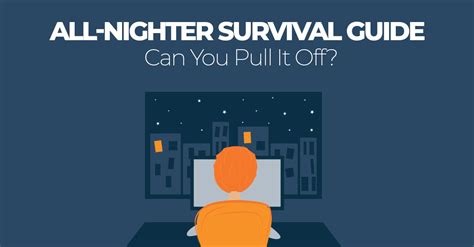Introduction

All-nighters, a time-honored tradition among students and professionals alike, can be daunting experiences. Staying up late into the night to cram for exams, finish projects, or meet deadlines can take a heavy toll on both your physical and mental well-being. However, with proper planning and strategy, you can make the most of your all-nighters while minimizing the negative effects.
Planning Ahead
- Choose the right night: If possible, avoid all-nighters before important events or exams.
- Set realistic goals: Don’t try to do too much in one night. Prioritize tasks and focus on the most important ones.
- Gather materials: Make sure you have everything you need before starting, including pens, paper, books, and snacks.
- Create a comfortable environment: Choose a well-lit and quiet place to work where you won’t be distracted.
Staying Awake and Focused
- Caffeine: Coffee and energy drinks can provide a quick energy boost, but use them in moderation to avoid jitters and crashes.
- Physical activity: Get up and move around every hour or so to improve circulation and reduce drowsiness.
- Brain games: Solve puzzles, play memory games, or engage in other mentally stimulating activities to keep your brain active.
- Music: Listen to upbeat or classical music to boost alertness and focus.
- Nap strategically: If you must nap, keep it short (15-20 minutes) to avoid disrupting your sleep cycle.
Managing Energy Levels
- Eat healthy snacks: Avoid sugary or processed foods that can cause energy crashes. Opt for nutrient-rich snacks like fruits, vegetables, and whole grains.
- Hydrate: Drink plenty of water throughout the night to stay hydrated and prevent fatigue.
- Take breaks: Schedule regular breaks to give your mind and body a chance to rest and refresh.
Protecting Your Health
- Get some sleep: Even a few hours of sleep before your all-nighter can make a significant difference in your performance and recovery.
- Listen to your body: If you’re feeling overwhelmed or exhausted, take a break or go to sleep.
- Avoid alcohol and drugs: These substances may impair your judgment and make it harder to focus.
- Take care of your eyes: Use artificial tears or blink frequently to prevent dry eyes.
Strategies for Different Tasks
Studying for Exams:
- Active recall: Regularly test yourself on the material by reciting it aloud or writing it down from memory.
- Spaced repetition: Review material at increasing intervals to improve long-term retention.
- Concept mapping: Create diagrams to visualize the relationships between concepts.
- Pomodoro Technique: Use alternating periods of focused work and short breaks to maintain productivity.
Writing Projects:
- Outline and plan: Create a structured outline before you begin writing to ensure a coherent flow of ideas.
- Break down the task: Divide large projects into smaller, manageable chunks to make them less overwhelming.
- Use writing tools: Utilize software or apps that assist with grammar, spelling, and style.
- Seek feedback: Have someone else review your writing to identify areas for improvement.
Meeting Deadlines:
- Time management: Plan a realistic timeline and allocate time wisely to each task.
- Prioritize tasks: Focus on the most urgent and important tasks first.
- Delegate responsibilities: If possible, delegate tasks to others to lighten your workload.
- Communicate effectively: Keep stakeholders informed of your progress and any potential delays.
Benefits of Surviving an All-Nighter
While all-nighters are often unavoidable, there are some potential benefits to consider:
- Increased productivity: Staying up late can allow you to complete tasks that you might not have time for during the day.
- Enhanced creativity: Being tired can sometimes lead to unconventional and innovative thinking.
- Sense of accomplishment: Completing a task despite the lack of sleep can boost your self-esteem.
Caution:
It’s crucial to recognize that all-nighters can have significant negative effects on your health and well-being. Use all-nighters sparingly and prioritize your sleep whenever possible.
Conclusion
All-nighters can be challenging, but by following these strategies and tips, you can make the experience more productive and less detrimental to your health. Remember to plan ahead, stay focused, take care of your body, and prioritize sleep when possible. With the right preparation and mindset, you can effectively navigate all-nighters and achieve your goals without sacrificing your well-being.
